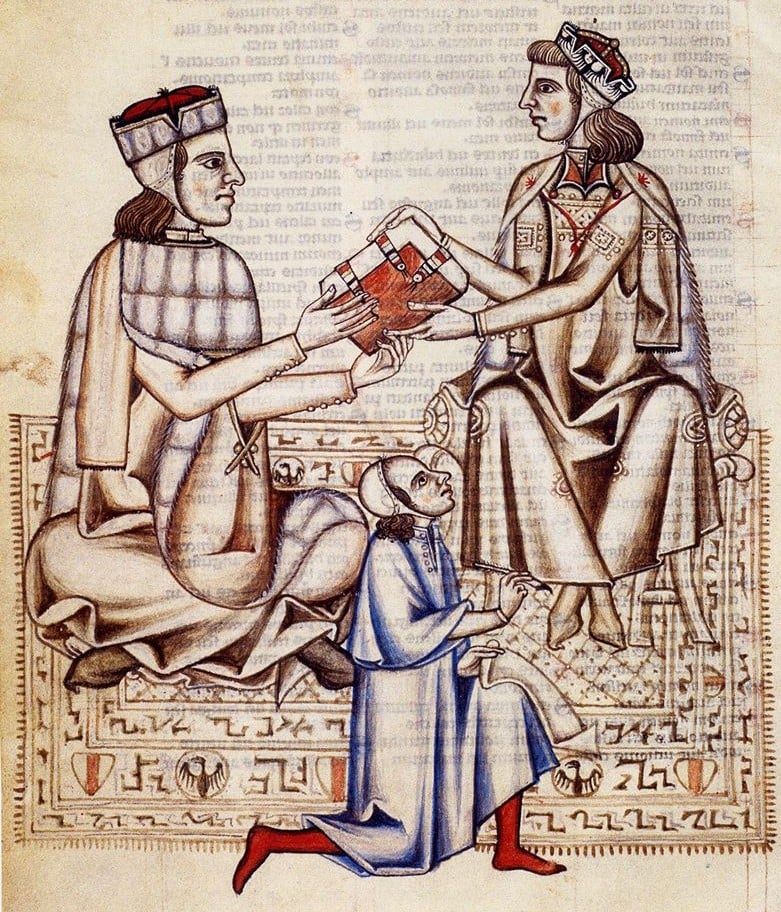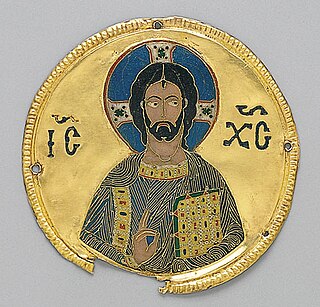
In the history of Europe, the Middle Ages lasted from the 5th to the 15th century. It began with the fall of the Western Roman Empire and merged into the Renaissance and the Age of Discovery. The Middle Ages is the middle period of the three traditional divisions of Western history: classical antiquity, the medieval period, and the modern period. The medieval period is itself subdivided into the Early, High, and Late Middle Ages.

Year 1270 (MCCLXX) was a common year starting on Wednesday of the Julian calendar.

Manfred was the last King of Sicily from the Hohenstaufen dynasty, reigning from 1258 until his death. The natural son of the Holy Roman Emperor Frederick II, Manfred became regent over the kingdom of Sicily on behalf of his nephew Conradin in 1254. As regent he subdued rebellions in the kingdom, until in 1258 he usurped Conradin's rule. After an initial attempt to appease pope Innocent IV he took up the ongoing conflict between the Hohenstaufens and the papacy through combat and political alliances. He defeated the papal army at Foggia on 2 December 1254. Excommunicated by three successive popes, Manfred was the target of a Crusade (1255–66) called first by Pope Alexander IV and then by Urban IV. Nothing came of Alexander's call, but Urban enlisted the aid of Charles of Anjou in overthrowing Manfred. Manfred was killed during his defeat by Charles at the Battle of Benevento, and Charles assumed kingship of Sicily.
Joseph Reese Strayer (1904–1987) was an American medievalist historian. He was a student of and mentored by Charles H. Haskins, America's first prominent medievalist historian.
Nigel Saul is a British academic who was formerly the Head of the Department of History at Royal Holloway, University of London (RHUL). He retired in 2015 and is now Emeritus Professor. He is recognised as one of the leading experts in the history of medieval England.

The European Bronze Age is characterized by bronze artifacts and the use of bronze implements. The regional Bronze Age succeeds the Neolithic. It starts with the Aegean Bronze Age in 3200 BC (succeeded by the Beaker culture), and spans the entire 2nd millennium BC in Northern Europe, lasting until c. 600 BC.
Jaroslav Thayer Folda III is a medievalist, in which field he is a Haskins Medal winner; he is a scholar in the history of the art of the Crusades and the N. Ferebee Taylor Professor of the History of Art at the University of North Carolina. His area of interest for teaching and research is the art of the Middle Ages in Europe and the Mediterranean world.

David C. Nicolle is a British historian specialising in the military history of the Middle Ages, with a particular interest in the Middle East.

Post-classical history is a periodization commonly used by the school of "world history" instead of Middle Ages (Medieval), which is roughly synonymous. The period runs from about AD 500 to 1450 though there may be regional differences and debates. The era was globally characterized by the expansion of civilizations geographically, the development of three of the great world religions, and development of networks of trade between civilizations.
Henry Royston Loyn, FBA, was a British historian specialising in the history of Anglo-Saxon England. His eminence in his field made him a natural candidate to run the Sylloge of the Coins of the British Isles, which he chaired from 1979 to 1993. He was Professor of Medieval History in the University College of South Wales and Monmouthshire and afterwards Professor of Medieval History at Westfield College in the University of London.
Clifford J. Rogers is a professor of history at the United States Military Academy at West Point. He has also been a Leverhulme Visiting Professor at Swansea University, an Olin Fellow in Military and Strategic History at Yale, and a Fulbright Fellow at the Institute of Historical Research in London.

Christianity in the 12th century was marked by scholastic development and monastic reforms in the western church and a continuation of the Crusades, namely with the Second Crusade in the Holy Land.
Jay Rubenstein is an American historian of the Middle Ages.
David Bruce Crouch, is a Welsh historian and academic. Since 2000, he has been Professor of Medieval History at the University of Hull.
Ralph A. Griffiths is an Emeritus Professor at Swansea University. He was born and brought up in a mining valley between Glamorgan and Monmouthshire. He attended "one of Wales' good grammar schools and was well taught in most subjects". He is a graduate of the University of Bristol and was appointed to a research post, and then promoted to higher academic positions, at Swansea in 1964.
Anna Brechta Sapir Abulafia, is a British academic who specialises in religious history. Since 2015, she is the Professor of the Study of the Abrahamic Religions in the Faculty of Theology and Religion at University of Oxford and a Fellow of Lady Margaret Hall, Oxford.
Warren C. Brown is professor of history at the California Institute of Technology. Brown's research relates to the social history of early Medieval Europe, conflict resolution, and social and institutional memory. He is the editor of the Medieval World Series published by Routledge.
Christopher Tyerman is an academic historian focusing on the crusades. In 2015, he was appointed Professor of History of the Crusades at the University of Oxford.
Nora Berend is a Fellow of St Catharine's College, Cambridge and a reader in European History at the Faculty of History.







